Contractor Comment: Diversification key for JO Straughan and Co
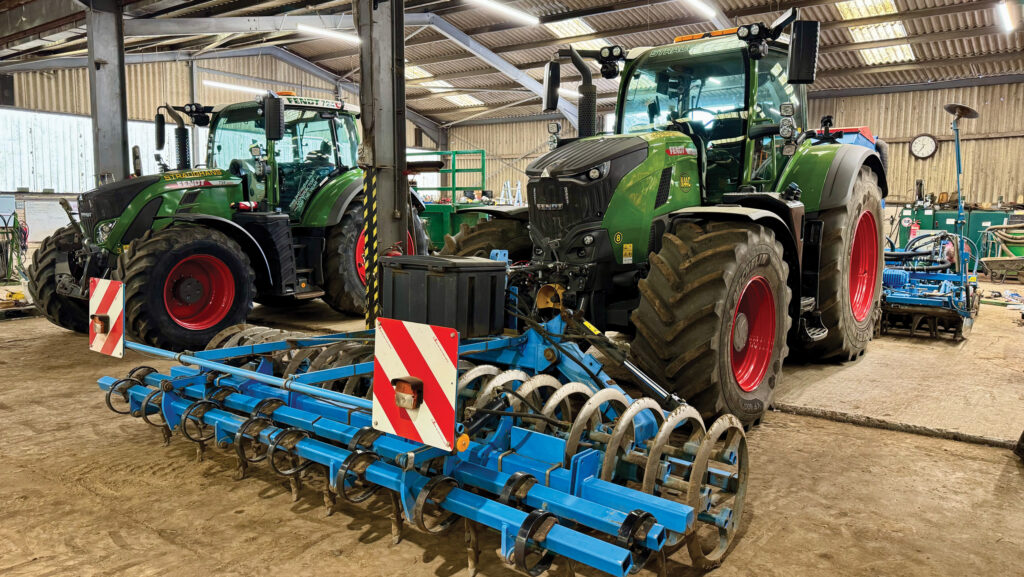 Fendt 728 and 724 © MAG/Oliver Mark
Fendt 728 and 724 © MAG/Oliver Mark JO Straughan & Co has been offering a comprehensive range of agricultural, plant hire and haulage services to customers in Northumberland and the Scottish Borders since 1955.
Owner Roger Dickinson runs the business alongside his wife Sandra, sons Stuart and David, and daughter-in-law, Debbie.
See also: Contractor Comment: Challenges of contracting on a small island
We find out all about the business and some of the machines they use.
Business facts
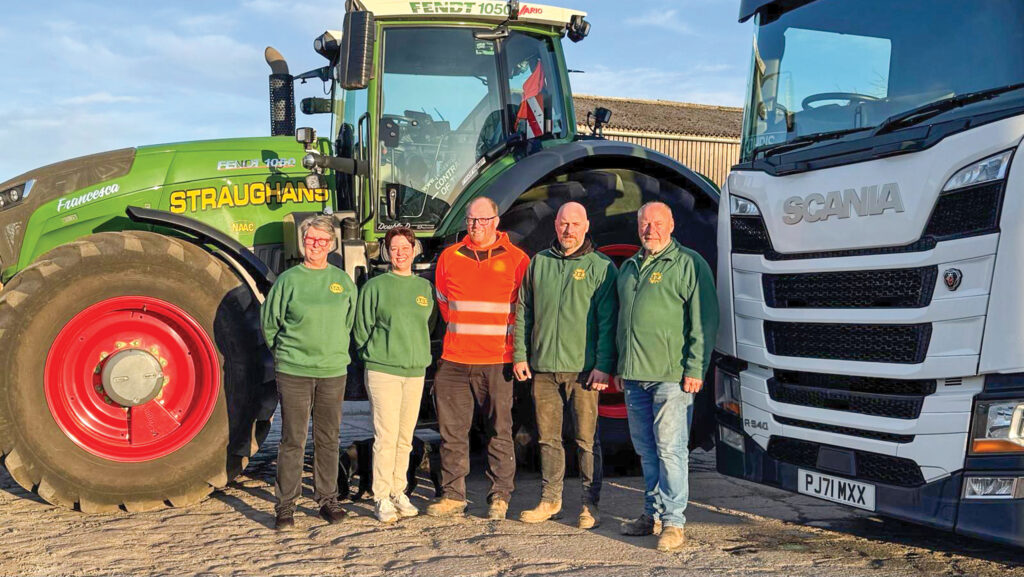
© JO Straughan & Co
JO Straughan & Co, Netherton Park Steads, Stannington, Morpeth, Northumberland
- Main services: Grass silage (2,500ha), combining (1,400ha), cultivating and drilling (3,400ha), square baling (45,000 bales)
- Other: 400ha contract farming (stubble-to-stubble arable contracts), treated biosolids spreading (55,000t), bulk haulage of straw (2,500t), grain (16,000t) and biomass wood pellets (10,000t), plant hire and machinery transport
- Staff: 11 full-time plus up to another three during the busy season
How did you get into contracting?
JO Straughan & Co has been going for 70 years, having been started by Sandra’s dad in 1955. I joined in 1975 and, when he sadly died in 1984, we were left to either sink or swim.
But, thanks to good customers, weather, yields and prices, the 1980s turned out to be an ideal time for expansion.
This allowed us to gradually reduce our reliance on reclamation work at opencast coal sites and move into mainstream ag contracting, having previously only really been involved with cultivations and combining.
Around that time, farmers started growing a lot more winter cereals in this area, and that kept us busy in the autumn as we were able to offer a full farm contracting service.
We also bought our first big square baler, a Hesston 4900, which was a revelation for customers as they had far fewer bales to collect than with a round baler.
Soon after, we got into silaging, initially with a Reco Mengele and, two years later, a Claas 695 Mega that I bought at Smithfield Show.
We continued to grow through the 1990s and noughties, and my sons David and Stuart intend to carry that on.
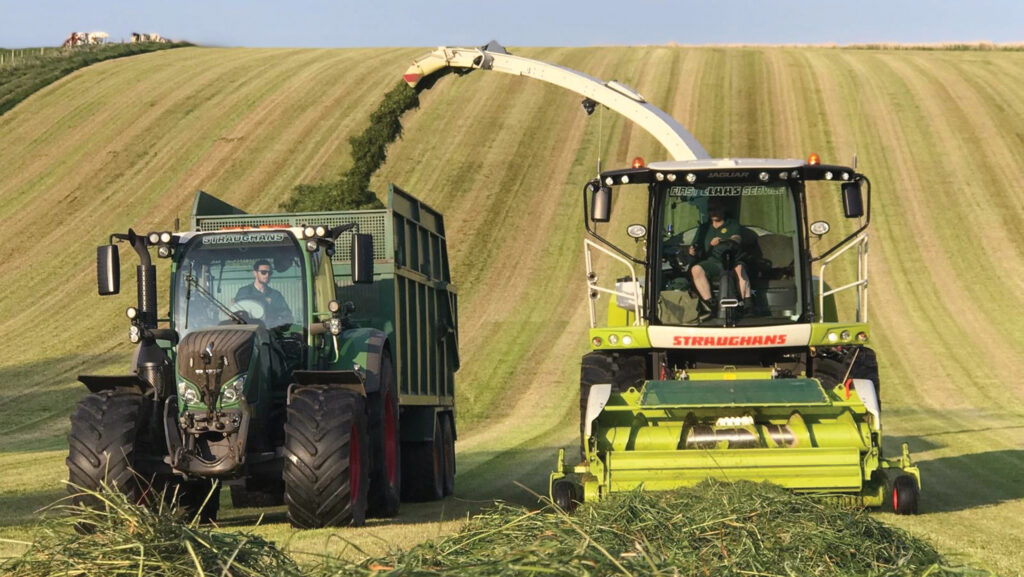
© JO Straughan & Co
Main contracting enterprises today?
We offer pretty much everything except spraying, which we subcontract.
We’d like to get into it, and have come close on a couple of occasions, but it needs the right person in the seat. After all, we’re in a service industry and high work standards are our top priority.
Any forms of diversification?
Agriculture accounts for 85% of our work, but having a few alternative income streams is the best way of maintaining cashflow through leaner months.
That’s now truer than ever, as ag working windows can be really tight and we’re geared up to cover a serious amount of ground in a very short period, which potentially leaves us with some extended quiet spells.
We started diversifying with plant hire during the foot-and-mouth crisis in the early 2000s.
And, when we began to worry about moving the diggers around with Fastracs on red diesel, we bought our first wagon in 2007.
Construction can be lucrative, but it’s also the source of our worst debts, so we are selective about the jobs we take on.
The sector is too competitive and doesn’t dovetail very neatly with agriculture.
Those customers want us there all year, but we mainly want the work to fill our winter voids, and it’s very much feast or famine.
We’d be constantly searching for new contracts.
Instead, we have a string of farm-related enterprises.
This includes buying about 1,200ha of straw in the swath, which we bale, store and lead to dairy farms in the west over winter, and hauling feed, grain and biomass wood pellets with our two wagons.
We’ve also got a 55,000t/year biosolids spreading contract with Northumbrian Water.
For this we supply an excavator for stockpiling and have three weigh cell- and GPS-equipped 12t Bunning HBDs that run from mid-July to September.
There’s a lot of red tape involved, but once you’re in the system it’s relatively straightforward. Utilities contracts are generally quite easy to manage.
Our little winter earner is sending out 2t trailed salt spreaders behind the pickups. The lads do it on two-night rotas and they enjoy it – it’s a change of scenery and a bit of extra cash.
Most profitable contracting enterprise?
Contract farming agreements are our most profitable, and we managed to double our area to 400ha last year. The more effort we put in, the greater the rewards.
We also have a good contract establishing vining peas for Scottish Borders Produce, something we’ve been doing since 2009.
It’s usually between 500ha and 600ha and takes us as far north as East Lothian. Since we’ve been doing it, we’ve picked up a fair bit more work in the area.
As for general ag services, the most profitable are high-speed, shallow-depth cultivations and drilling. In the right conditions, we’re geared up to get a lot done in very little time.
And the least profitable?
Ploughing. It should be priced at £55/acre (£135/ha), including diesel, based on a 10% profit margin, but we’re a fair way off that.
It’s a loss leader – metal is expensive and output low – though we have cut back. We used to run six ploughs, but now have three.
Non-inversion tillage is quicker, more efficient and more cost-effective for us and our customers. The two Simba SLs are relatively cheap to run and form a good seed-bed.
This demonstrates the importance of knowing your costs. The National Association of Agricultural Contractors’ pricing tool is invaluable.
And though prices might sometimes seem high to under-pressure customers, they need to appreciate the costs involved.
Scania charges its fitters out at £169 an hour. On that basis, agricultural contractors are providing exceptionally good value services.
Biggest threats to your business?
Bureaucracy. The goalposts are moving too far and too often, which isn’t helpful when you’re trying to make sensible, long-term investments in expensive machinery.
The grant system and BPS payments have traditionally been an issue for us, as they have tempted farmers into buying kit that is bigger than they need.
They can then undercut us on price – but only once they’ve finished working their own land.
So, as much as astronomical machinery prices are a challenge for us, they also present opportunities. Farmers are being priced out of the market.
We’re able to spread our costs over thousands of acres and, provided we buy the right machine for the right price, we can make it far cheaper for them.
The great thing about contracting is there are always opportunities. We’ve been here for 70 years and don’t intend to go anywhere for at least a couple more generations. We’ll just have to adapt as we go.
Difficulties with staff recruitment?
We have a fantastic team, some of them have been here for nearly 30 years. We like to listen to their opinions, look after them where we can, and try to provide a good work/life balance.
That’s not always easy when they love what they do, and there have been times when some of them haven’t had a day off between April and October.
But it’s something we’re focused on proactively improving, starting with having Sundays off whenever possible. People are always in a better place come Monday morning.
Recruitment is a challenge, especially with youngsters that want the top jobs without earning their way up. We have to be selective to start with and diplomatic afterwards.
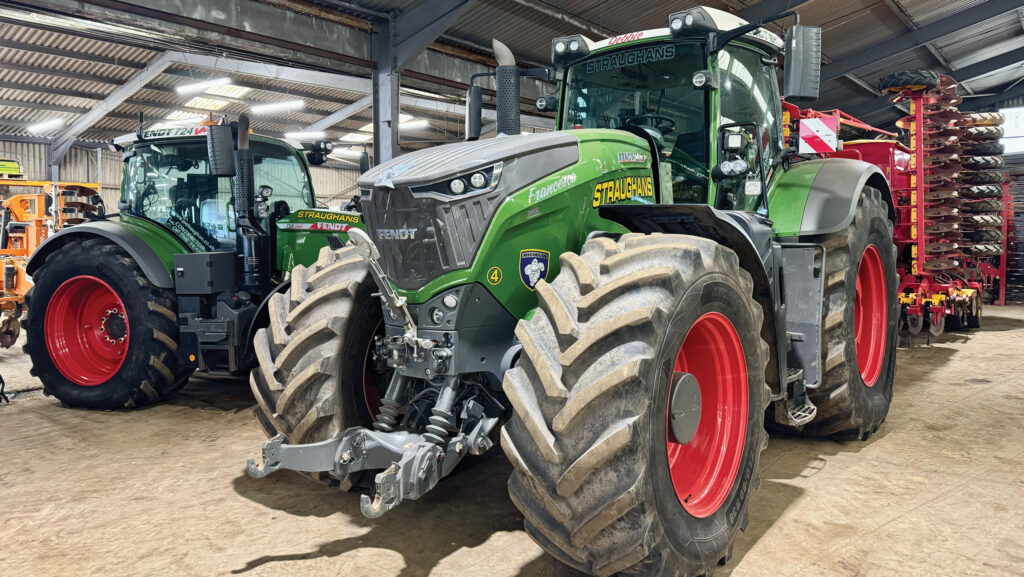
Fendt 1050 © MAG/Oliver Mark
What excites you about the season ahead?
The crops look well, which is a good start.
If the weather is with us then it’ll hopefully be another a very enjoyable year, particularly compared to 12 months ago when we were coming off the back of a nightmare 2023.
A repeat of 2018 would be nice; we didn’t work a single weekend at harvest.
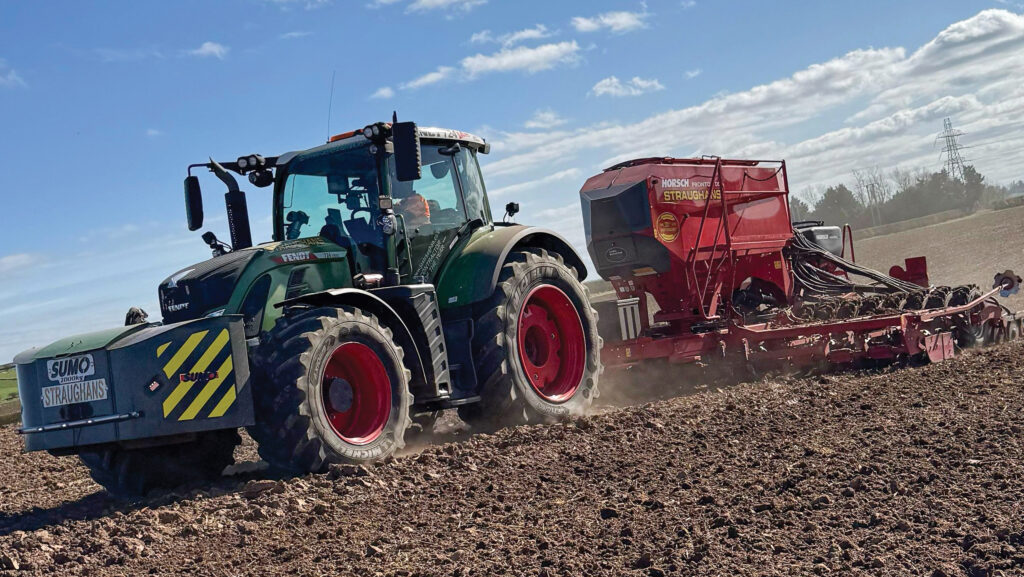
© JO Straughan & Co
New machines in 2025?
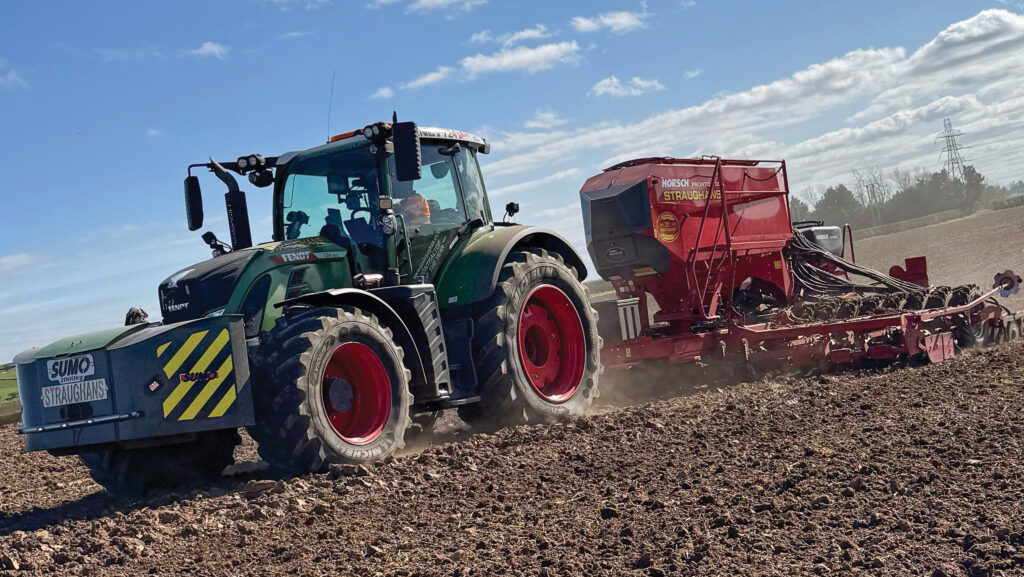
© MAG/Oliver Mark
Last autumn we replaced the JCB 416 with a 419, mainly to get a bigger bucket for the biosolids job, and the Fendt 718 with a 728.
This year, there’s a 6m Horsch Pronto coming to replace our 8m Vaderstad Rapid, which we’ve had since 2014.
It was a great drill, but quite a few of our customers are now on 36m tramlines, so the Pronto will fit in well and should be easier to pull.
Plus, it’s got three hoppers for grain, fertiliser and companion crops, which will come in handy. Sadly, the second-hand market for 8m Rapids has dropped off a cliff.
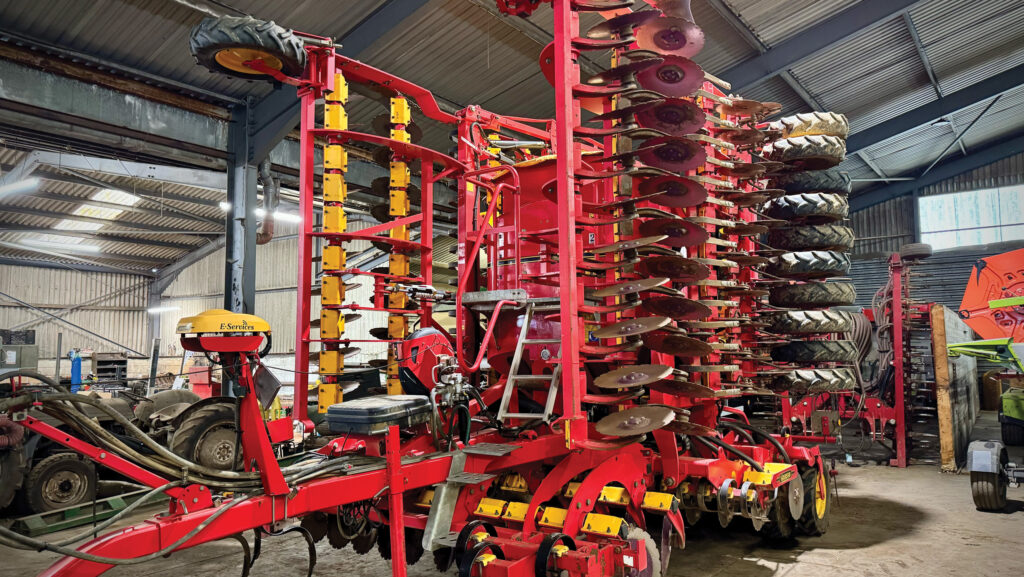
© MAG/Oliver Mark
We’ve also bought a 2,300-litre twin-tank Lemken front hopper with press wheels, which we’ll run ahead of a 4m power harrow disc drill.
We’re leaning towards this setup and away from the Solitair 9s mainly to improve tractor weight balance. They’re also cheaper to run as we don’t need a separate front press.
But the biggest investment is in a new Scania R540 tractor unit. Our Volvos have had their share of problems and we want a bit more reliability, as they’re expensive to run at the best of times.
For that reason, we’ll probably try and keep them newer, replacing them every four or five years.
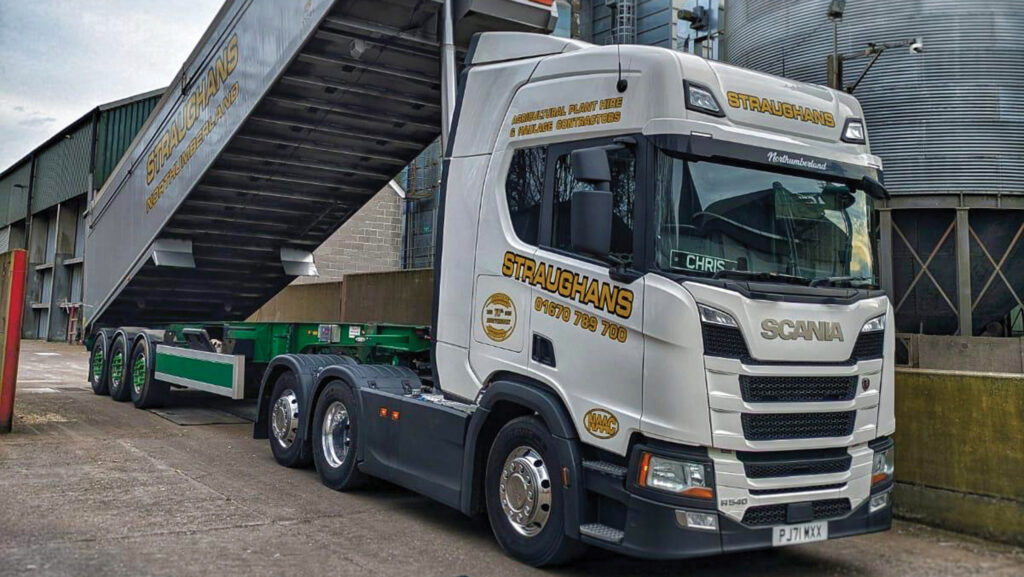
© JO Straughan & Co
Recent major repairs/breakdowns?
Our Fendt 939 has been away for three weeks getting a replacement engine after a water leak.
Thankfully, Fendt is covering the cost of the short motor and we’ll foot the bill for the labour.
It’s on 10,500 hours and was due to be changed but, now that it has been fitted with a new engine at great expense, that move will be on ice for a couple of years.
All of the other Fendt tractors are on 8,000-hour warranties which gives us peace of mind, but does mean we have to take the manufacturer service package.
We tend to change them at the end of the warranty, at an average cost of £15/hour, though we do take some longer. Our 720 has clocked 13,000.
Agco’s Route 66 policy of splitting brands across its dealerships has presented some challenges, as the Ancroft Tractors fitter is having to travel 97 miles to get to us.
Whether it necessitates a rethink on our side remains to be seen, but we have been impressed with the Massey Ferguson 8S.265s we hired to spread the biosolids last summer.
The only other breakdown of note was a collapsed gearbox bearing on one of the Bunning spreaders, which we noticed during a routine service.
There was wear in the crown wheel and pinion, and replacement parts were going to cost £4,500, so we opted to fit a reconditioned gearbox instead.
We weren’t too bothered by that, as it’s otherwise caused us no problems over five years. It helps that they’re spreading processed material with very few foreign objects – unlike farmyard manure.
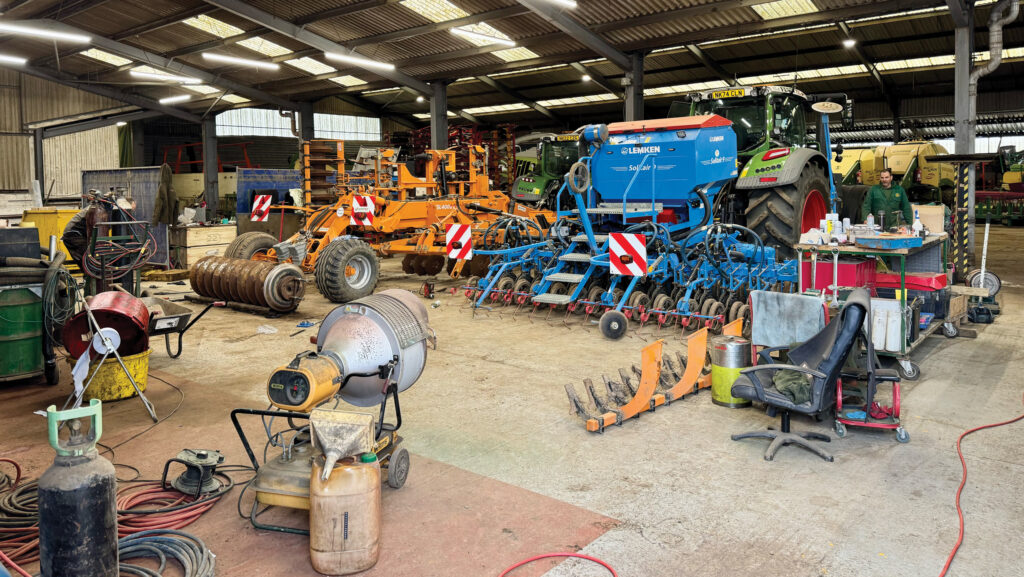
© MAG/Oliver Mark
Overwinter projects?
We like to get every machine in the workshop from November onwards for a thorough service.
Other than that, winter is holiday season.
Current contractor frustrations?
Nothing dominates our lives quite like the weather.
The whole job is easy if it’s with you, but you have to be prepared for it not to be. That usually means out-of-hours work; we’re in a service industry and the customer comes first.
We’ve had years when the forager gang has clocked more overtime than normal hours.
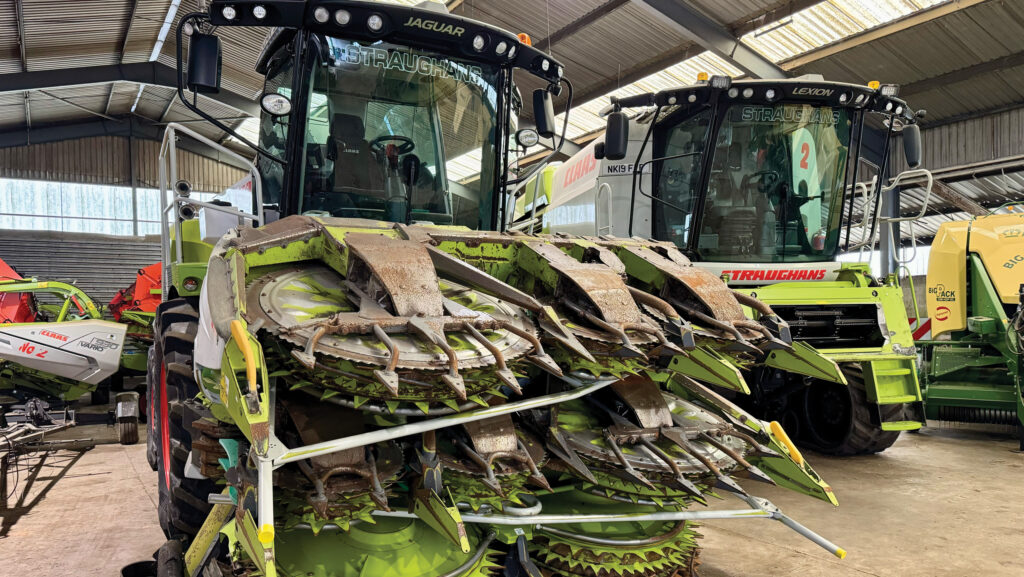
© MAG/Oliver Mark
The other major source of frustration is slow payments. Our payment terms are 14 days and customers get the invoice almost as soon as the job is completed.
We’ll happily work with them on structuring repayments, provided they keep the line of communication open.
But if they fail to do so there’s a knock-on effect for everyone – including them if they don’t have the kit to do it themselves.
Kit list

© MAG/Oliver Mark
- Tractors Fendt 1050, 939, 728, 724 x4, 720; Massey Ferguson 8S.265 x3 (hired for summer)
- Combines Claas Lexion 8700TT (10.8m header) and 760TT (9.3m header)
- Forager Claas Jaguar 970 with Direct Disc cutterbar and 12-row maize header
- Balers Krone 1290 x3, 890 and Comprima
- Handlers JCB 419S and TM320S; Claas Scorpion
- Cultivators Simba Great Plains SL 5m and 4m, Simba Unipress 8.3m, Vaderstad Rexius Twin 820, He-Va Cambridge rolls 12.2m, Vaderstad Cambridge rolls 8.2m, Simba 23D discs x2, Lemken and Kverneland ploughs, He-Va subsoilers and Sward Lifter
- Drills Horsch Pronto 6m, Vaderstad Rapid 4m, Kuhn combi 6m and 3m, Lemken combi 4m, Vaderstad Tempo eight-row, Samco six-row
- Muckspreaders Bunning Lowlander 120 HBD x3
- Haulage Scania R540, Volvo FM13 500, Fruehauf bulk trailers, Kassbohrer low-loader
- Plant Volvo EC160 excavator, Cat 953C traxcavator, JCB 4CX and 8027Z

